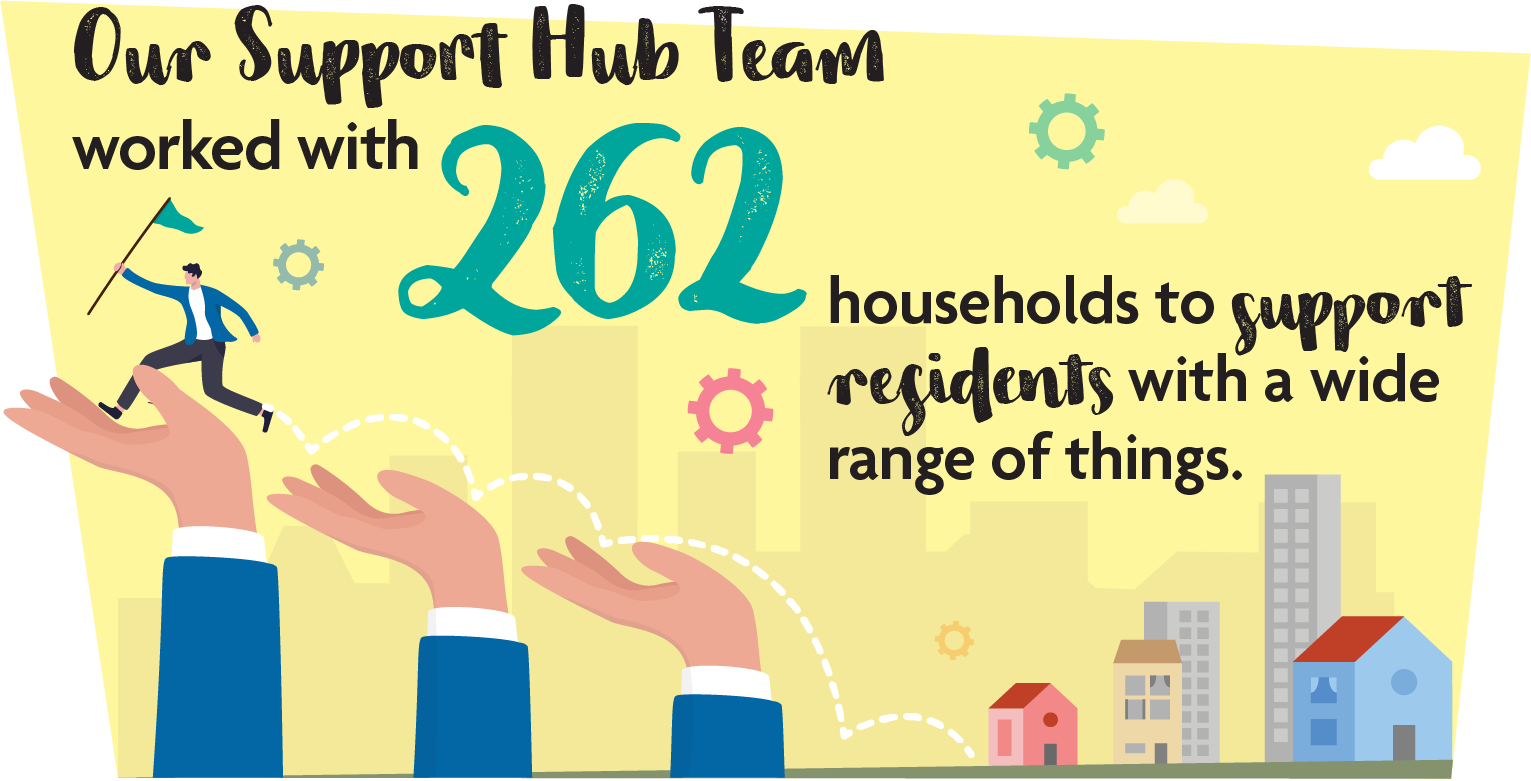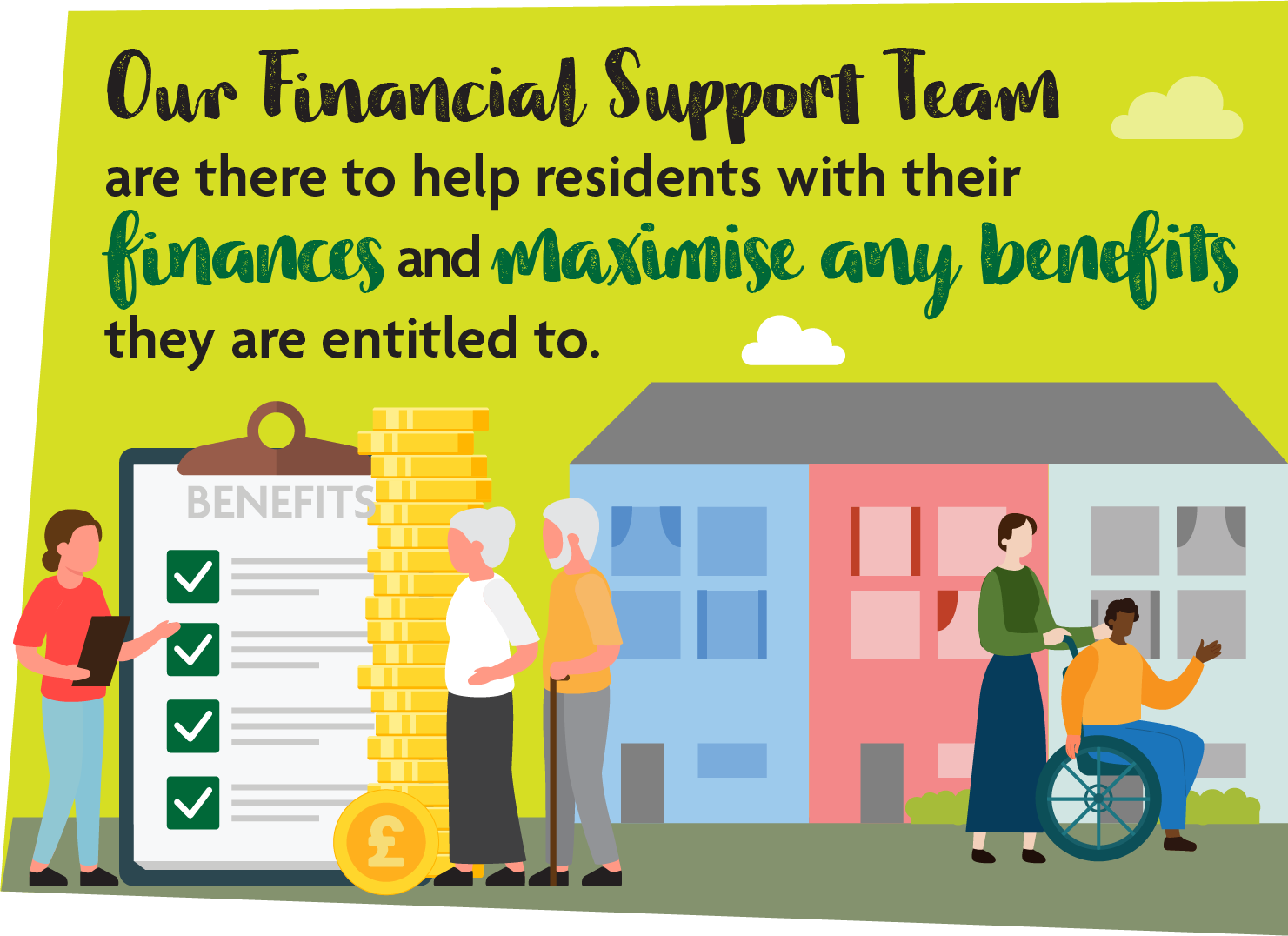Social impact

Our founders mantra ‘housing is not enough’ is demonstrated in our work to maximise social impact, with our support services for all residents and specialist supported housing for young people, older and disabled people.
The work of our Support Hub Team really highlights our commitment to supporting our residents and wider society, since its creation on World Mental Health Day in 2022, the team have worked with 262 households supporting people with a range of difficulties including social isolation, mental health challenges, self-neglect, and complex hoarding.
Our colleagues across the organisation, who may not meet our residents in their day-to-day work, are allocated two days each year to go out and volunteer in the communities we work in. In 2023/24 117 of our colleagues volunteered on a whole range of things, from gardening and painting communal spaces and community halls to litter picking and helping run events across the communities we work in.

Some examples of the complex support offered by our Support Hub Team, all names have been changed to protect privacy:
Jo has mental health challenges and expresses feeling very isolated. Jo was referred for a Social Services assessment and to a local agency to request a befriender. She now feels in a much better space with an allocated mental health worker and a befriender in place.
David was facing eviction for rent arrears. He was supported by the Support Hub to apply for a Discretionary Housing Payment, securing a £3,200 payment, clearing his arrears and rescuing his tenancy. His housing related benefits are now being paid and are all up to date.
Ahmed was previously referred for hoarding, he worked to clear his property, but was referred again as his flat returned to a high clutter state and he was potentially facing eviction. The Support Hub requested he was given another chance. Assisted by family and friends, he decluttered his home within a two-week period, meeting his personal goal to achieve this before Ramadan.
Preventing crisis
This year we introduced a Check-Back Calendar for our most at-risk residents. Appointments are booked in advance for welfare checks throughout the year. This helps us review the circumstances of residents who have previously used the service, particularly our residents with a history of self-neglect and hoarding and supports our colleagues in managing potential fire risk.
In our work to tackle social isolation, we carried out 162 welfare calls to our older residents living alone in general needs housing. We supported them to report outstanding repairs, referred them for food vouchers, assisted with financial challenges and provided information on local community activities.
The Support Hub held its first social event in March 24, a Coffee Morning for our customers. The focus was to bring residents together to make new connections with other people living in their neighbourhood and following its success we are now planning to host an afternoon tea this summer.
See here for more details on the Support Hub model Safeguarding and our Support Hub.

Supporting our residents with their finances
Our Financial Support Team are there to help residents with their finances and maximise any benefits they are entitled to. Over the past few years, particularly during the cost of living crisis our Financial Support Officers have continued to help our residents with their finances and benefits. Here is a brief story of one of the residents that we have helped:
Case study: Mr J has long term ill health and he was relying on disability and housing benefits. He was struggling to make rent payments and the money he owed was increasing due to bedroom tax. Our Financial Support Officers helped support the process of making several Discretionary Housing Payment claims to meet the Housing Benefit shortfall before we supported him to find a suitable smaller property and to move home.
During our support, we were also able to access shopping and medical expenses vouchers to relieve some financial pressure which allowed him to focus on ensuring his rent account remained positive and to work towards his move."
In 2024/25 we’re continuing our focus on supporting the communities, households and the individuals within them through our support hub, supported housing schemes, specialist financial support team.
Our Community Fund is also now open for 2024/25– with funding invested in projects that make an impact to society and our communities here.

Celebrating 100 years: Mora Burnet
Mora Burnet was crucial to the establishment of the Ethical Union Housing Association. She was among a group of Ethical Union members who got together to plan some practical action in response to the need for social housing. The association was registered in 1954 and launched the following year. It went on to become the Humanist Housing Association (HHA) in 1965.
The main aim of the association was to provide self-contained accommodation to people in need, focusing particularly on older
people, people with older dependents or people experiencing mental health problems.
Mora and her husband Lindsay, who she married in 1948, were both founding members of the Management Committee. They held their first public meeting in 1955 to let people know what they were doing, get their support and discuss raising funds. As the main speaker at the meeting, Mora was key to the initial success of the association.
